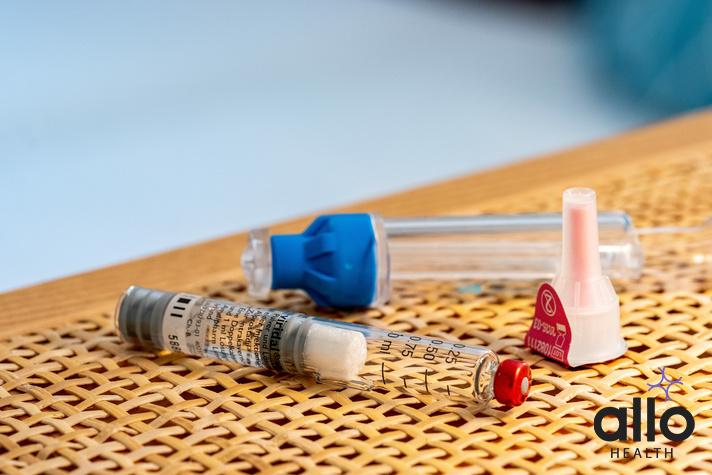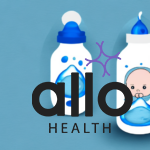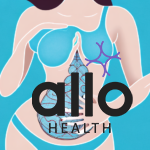Benefits And Risks Of Betnesol Injection In Pregnancy

Allo Health is dedicated to personalized well-being, offering support and trusted information tailored to individual health goals. The platform emphasizes human-generated content, led by a distinguished medical team of experts, including physicians and sexual health specialists. Their commitment to credibility involves rigorous fact-checking, authoritative research, and continuous updates to ensure accurate, up-to-date information. Allo Health's unique approach goes beyond conventional platforms, providing expert-led insights and a continuous commitment to excellence, with user feedback playing a crucial role in shaping the platform's authoritative voice.

Dr.Sushma.V completed MBBS degree from BGS GIMS,bangalore
Why This Was Upated?
Our experts continually monitor the health and wellness space, and we update our articles when new information became available.
Updated on 15 January, 2024
- Article was updated as part of our commitment to diversity, equity, and inclusion.

"The following blog article may discuss medical treatments and interventions. However, it is important to note that the information provided is for general educational purposes only and should not be considered as a substitute for professional medical advice, diagnosis, or treatment. Always seek the guidance of a qualified healthcare professional for personalized medical advice.
Book consultation
Medical treatments are complex and should be tailored to individual circumstances. The information presented in this blog may not be applicable to everyone, as each person's medical condition, history, and needs are unique. Only a qualified healthcare professional can evaluate your specific medical situation, consider relevant factors, and provide appropriate recommendations for diagnosis, treatment options, and monitoring.
It is crucial to note that self-diagnosis, self-medication, or relying solely on the information provided in this blog for treatment decisions can have serious health consequences. "
When it comes to pregnancy, every parent wants the best for their unborn child. However, pregnancy can be a challenging time and various complications may arise. One such complication is premature delivery. Doctors may prescribe Betnesol Injection to pregnant women at risk of delivering their baby prematurely. Betnesol Injection contains betamethasone, a steroid drug that can help the lungs of premature babies develop more quickly. This article aims to explore the uses, benefits and risks of Betnesol Injection during pregnancy.
What is Betnesol Injection?
Betnesol Injection is a medication that contains the active ingredient betamethasone, which belongs to a class of drugs known as corticosteroids or steroids. Betamethasone is a potent synthetic corticosteroid that has anti-inflammatory, immunosuppressive and anti-allergic properties. It is used to treat a variety of conditions where inflammation and immune response play a role.
Indications and Uses: Betnesol Injection is primarily used in the following conditions:
- Inflammatory Conditions: Betnesol is used to treat various inflammatory conditions such as severe allergic reactions, arthritis, asthma, skin disorders and inflammatory bowel diseases.
- Immune System Disorders: It is also used to suppress the immune system and is used in conditions where the immune system is overactive, such as autoimmune diseases.
- Certain Cancers: Betnesol can be used in the treatment of certain types of cancers, often in combination with other medications.
Administration: Betnesol Injection is usually given by a healthcare professional, either into a muscle (intramuscular) or into a vein (intravenous). The choice of injection site and dosage depends on the specific condition being treated and the patient’s response to the medication.
Dosage and Duration: The dosage and duration of Betnesol Injection will be determined by the prescribing healthcare provider. It’s essential to use this medication exactly as prescribed, following the recommended dosage and schedule. Abruptly stopping the medication without your doctor’s guidance can lead to withdrawal symptoms.
It’s crucial to discuss your medical history and any current medications or supplements with your healthcare provider before starting Betnesol Injection to prevent potential interactions or complications. This information is a general overview, and it’s important to follow the specific instructions provided by your healthcare provider.
Betnesol Injection Uses And Benefits
Betnesol Injection, containing the active ingredient betamethasone, is a powerful corticosteroid used to treat a variety of conditions due to its anti-inflammatory and immunosuppressive properties. Here are the uses and benefits of Betnesol Injection in detail:
- Inflammatory Disorders:
- Arthritis: Betnesol Injection can be used to manage the inflammation associated with various forms of arthritis, including rheumatoid arthritis and osteoarthritis.
- Allergic Reactions: It is effective in treating severe allergic reactions, such as anaphylaxis, angioedema and severe allergic asthma attacks.
- Skin Conditions: Betnesol Injection is used for severe skin conditions like psoriasis and dermatitis where rapid and potent anti-inflammatory action is required.
- Inflammatory Bowel Diseases: Conditions like Crohn’s disease and ulcerative colitis, which involve inflammation of the digestive tract, can be managed using Betnesol Injection during flare-ups.
- Autoimmune Diseases:
- Lupus: Betnesol Injection can be a part of the treatment plan for systemic lupus erythematosus (SLE), an autoimmune disease that affects various organs and tissues.
- Multiple Sclerosis: In multiple sclerosis, the immune system attacks the nerves. Betnesol can help reduce inflammation during acute exacerbations.
- Respiratory Disorders:
- Asthma: In severe asthma attacks, Betnesol Injection may be used to quickly reduce inflammation in the airways, allowing for easier breathing.
- Chronic Obstructive Pulmonary Disease (COPD): Betnesol can be used in acute exacerbations of COPD to reduce airway inflammation.
- Organ Transplantation:
- Immunosuppression: After organ transplantation, the body’s immune system may reject the new organ. Betnesol Injection is used as an immunosuppressive agent to prevent this rejection and allow the body to accept the transplanted organ.
- Certain Cancers:
- Leukemia and Lymphoma: Betnesol, in combination with other medications, can be used in the treatment of certain types of leukemia and lymphoma to reduce inflammation and suppress the immune response.
- Other Conditions:
- Cerebral Edema: Betnesol Injection can be used to reduce brain swelling in conditions such as brain tumors or head injuries.
- Severe Dermatological Conditions: In severe cases of conditions like pemphigus, where the immune system attacks the skin, Betnesol can help manage symptoms.
Benefits:
- Rapid Relief: Betnesol Injection provides quick relief in acute conditions where immediate suppression of inflammation is crucial, such as severe allergic reactions or asthma attacks.
- Immunosuppression: It suppresses the immune response, which is beneficial in autoimmune diseases and organ transplantation, preventing the body from attacking its own tissues or foreign transplanted organs.
- Versatility: Betnesol Injection can be administered intramuscularly or intravenously, allowing for flexibility in its use depending on the severity of the condition.
- Reduction of Symptoms: By reducing inflammation, Betnesol Injection alleviates symptoms like pain, swelling and redness associated with various disorders, improving the patient’s quality of life.
It’s important to note that while Betnesol Injection has significant benefits in managing various conditions, its use should be closely monitored by healthcare professionals due to potential side effects and interactions with other medications. The dosage and duration of treatment should be determined by a qualified healthcare provider based on the specific medical condition and individual patient needs.
Betnesol Injection Side Effects
Betnesol Injection, like any medication, can cause side effects. It’s important to note that not everyone will experience these side effects, and their severity can vary from person to person. Below is a detailed list of potential side effects associated with Betnesol Injection:
Common Side Effects:
- Increased Appetite: Some individuals might experience an increase in appetite, which can lead to weight gain.
- Fluid Retention: Betnesol can cause the body to retain fluids, leading to swelling in the legs and ankles.
- Mood Changes: Mood swings, irritability or even mood disorders like depression and anxiety can occur, especially with long-term use.
- Insomnia: Difficulty falling asleep or staying asleep may happen due to the stimulating effects of the medication.
- Digestive Concerns: Gastric concerns such as indigestion, bloating or even ulcers can occur with prolonged use.
- Increased Blood Pressure: Betnesol can lead to an increase in blood pressure, which should be monitored regularly.
Less Common Side Effects:
- Skin Changes: Thinning of the skin, easy bruising, and slow wound healing can occur.
- Glaucoma: Long-term use of steroids like Betnesol can lead to increased intraocular pressure, potentially causing glaucoma.
- Muscle Weakness: Steroids can lead to muscle weakness or loss of muscle mass.
- Osteoporosis: Prolonged use can lead to weakening of bones, making them more susceptible to fractures.
- Suppressed Immune System: Betnesol suppresses the immune system, making the body more susceptible to infections.
- Adrenal Suppression: Long-term use can suppress the adrenal glands’ natural production of steroids, which can lead to adrenal insufficiency when the medication is stopped suddenly.
- Hyperglycemia: Betnesol can raise blood sugar levels, especially in people with diabetes.
Serious Side Effects (Seek Medical Attention Immediately):
- Allergic Reactions: Symptoms may include rash, itching, swelling of the face, tongue, or throat, severe dizziness or trouble breathing. This is a medical emergency.
- Severe Mood Changes: Including depression, mood swings or aggression.
- Signs of Infection: Such as fever, persistent sore throat or unusual tiredness.
- Vision concerns: Blurred vision, sudden eye pain or seeing halos around lights.
- Signs of Adrenal Insufficiency: Weakness, tiredness, dizziness, or confusion, especially if accompanied by nausea, vomiting or low blood pressure.
It’s essential to report any unusual or severe symptoms to your healthcare provider immediately. Additionally, patients should not stop taking Betnesol or change the dosage without consulting their healthcare provider, as sudden discontinuation can lead to withdrawal symptoms or worsening of the underlying condition.
This list is not exhaustive, and other side effects may occur. Always consult a healthcare professional for more comprehensive and personalized information about the potential side effects of Betnesol Injection.

Betnesol Injection Precautions
Taking Betnesol Injection (betamethasone) requires careful consideration of several precautions to ensure your safety and well-being. Here are detailed precautions you should be aware of:
- Medical History: Before taking Betnesol, inform your healthcare provider of your complete medical history, especially if you have a history of infections, diabetes, liver or kidney concerns, high blood pressure, heart disease, osteoporosis, or mental/mood disorders.
- Allergies: Inform your doctor about any allergies you have, especially if you are allergic to betamethasone or any other corticosteroids. Betnesol Injection may contain ingredients that can cause allergic reactions.
- Vaccinations: Avoid receiving live vaccines while using Betnesol, as it may not be as effective, and there might be a risk of developing a severe infection.
- Pregnancy and Breastfeeding: Betnesol should be used during pregnancy or breastfeeding only if the potential benefits justify the potential risks to the fetus or infant. High doses or prolonged use during pregnancy can harm the unborn baby. It may also pass into breast milk and could affect a nursing infant.
- Children: Betnesol Injection is usually not recommended for use in children unless prescribed by a pediatrician. Children are more sensitive to the effects of corticosteroids, which might affect their growth and development.
- Immune System: Betnesol suppresses the immune system. Avoid contact with people who have contagious diseases such as chickenpox or measles, as your immune response may be compromised.
- Long-term Use: Long-term use of Betnesol can lead to serious side effects such as osteoporosis, diabetes, and increased susceptibility to infections. Your healthcare provider will monitor your condition and adjust the dosage to minimize these risks.
- Diet and Exercise: While taking Betnesol, it’s important to maintain a healthy diet with adequate calcium and vitamin D to support bone health. Regular exercise can also help minimize the risk of bone density loss.
- Alcohol and Tobacco: Limit alcohol consumption and avoid tobacco products while using Betnesol, as these substances can increase the risk of gastrointestinal concerns and cardiovascular concerns.
- Monitor Blood Glucose: If you have diabetes, monitor your blood glucose levels regularly while using Betnesol, as it can raise blood sugar levels.
- Withdrawal: Do not stop taking Betnesol abruptly without consulting your healthcare provider. Sudden discontinuation can lead to withdrawal symptoms, especially if you have been on the medication for an extended period.
- Driving and Operating Machinery: Betnesol may cause dizziness or drowsiness in some individuals. If you experience these side effects, avoid driving or operating machinery until you know how the medication affects you.
Always follow your healthcare provider’s instructions regarding the dosage and duration of Betnesol Injection. If you experience any unusual or severe symptoms while taking this medication, contact your healthcare provider promptly.
Betnesol Injection Drug Interactions
Betnesol Injection (betamethasone) can interact with other medications and substances, potentially altering their effects in the body or increasing the risk of side effects. It’s crucial to inform your healthcare provider about all the medications, supplements and herbal products you are taking to avoid harmful interactions. Here is a detailed list of drug interactions associated with Betnesol Injection:
- Other Corticosteroids: Concurrent use of Betnesol with other corticosteroids, whether in oral, topical, or inhaled forms, can lead to an increased risk of side effects, particularly adrenal suppression.
- Nonsteroidal Anti-Inflammatory Drugs (NSAIDs): NSAIDs such as ibuprofen, aspirin and naproxen can increase the risk of gastrointestinal ulceration and bleeding when taken with Betnesol.
- Anticoagulants: Betnesol can increase the risk of bleeding when taken with anticoagulants like warfarin. Regular monitoring of blood clotting parameters is essential in such cases.
- Diuretics (Water Pills): Concomitant use with diuretics can lead to low potassium levels (hypokalemia). Regular monitoring of potassium levels is advised.
- Antidiabetic Agents: Betnesol can increase blood glucose levels. People with diabetes who are taking medications to lower blood sugar levels may require adjustments in their antidiabetic medication dosages.
- Vaccines: Avoid live vaccines while using Betnesol, as the weakened immune system response may reduce the effectiveness of the vaccine and increase the risk of developing the disease.
- Antibiotics: Certain antibiotics, particularly rifampicin and rifabutin, can increase the metabolism of corticosteroids, potentially reducing their effectiveness.
- Antifungal Agents: Certain antifungal medications like ketoconazole can inhibit the metabolism of corticosteroids, leading to an increased risk of side effects.
- HIV Medications: Protease inhibitors, commonly used in HIV treatment, can increase the levels of corticosteroids in the body, leading to an increased risk of side effects.
- Cyclosporine: Concurrent use with cyclosporine, an immunosuppressive drug often used in transplant patients, can increase the risk of kidney concerns.
- Estrogens: Estrogen-containing medications, including birth control pills, can increase the effects of corticosteroids. Regular monitoring is necessary.
- Lithium: Betnesol can decrease the elimination of lithium, leading to increased lithium levels in the body. Lithium toxicity can occur as a result.
- Amphotericin B: Concurrent use with amphotericin B, an antifungal medication, can increase the risk of low potassium levels and increase the risk of heart concerns.
- Phenytoin: Betnesol can increase the metabolism of phenytoin, an antiepileptic medication, potentially reducing its effectiveness.
This list is not exhaustive, and other medications or substances can interact with Betnesol Injection. Always consult your healthcare provider or pharmacist if you are unsure about the safety of taking any medications with Betnesol. Your healthcare provider can adjust your doses or monitor you more closely to prevent or manage interactions.
Benefits And Risks Of Betnesol Injection In Pregnancy
Betnesol Injection (betamethasone) is a corticosteroid medication used to manage a variety of conditions related to inflammation and immune response. When it comes to its use during pregnancy, it’s crucial to carefully consider the potential benefits and risks under the supervision of a healthcare provider. Here’s a detailed overview:
Benefits of Betnesol Injection in Pregnancy:
- Fetal Lung Development: Betnesol is sometimes prescribed to pregnant women at risk of preterm delivery (delivering the baby before 37 weeks of gestation). It is given to the mother to help accelerate fetal lung maturation, which can reduce the risk of respiratory distress syndrome (a breathing disorder in premature babies) if the baby is born prematurely.
- Prevention of Brain Bleeding: Betnesol is also used to prevent intraventricular hemorrhage (bleeding in the brain) in premature infants. By promoting lung maturation, the risk of this serious complication can be reduced.
Risks and Considerations:
- Potential Side Effects in the Mother: Like any medication, Betnesol carries the risk of side effects in the mother. These can include increased blood pressure, fluid retention, mood swings, and changes in blood glucose levels. These side effects need to be balanced against the potential benefits.
- Impact on Blood Sugar Levels: Betnesol can elevate blood glucose levels. This effect can be significant in pregnant women with gestational diabetes or those at risk of developing diabetes. Close monitoring of blood glucose levels is essential in such cases.
- Risk of Infection: Corticosteroids like Betnesol suppress the immune system. Pregnant women are generally more susceptible to infections, and the immunosuppressive effects of Betnesol could increase this risk.
- Effect on Fetal Growth: Prolonged or high-dose use of corticosteroids during pregnancy might be associated with a slightly increased risk of reduced fetal growth. This potential risk needs to be carefully weighed against the benefits, especially if the medication is being considered for conditions other than fetal lung development.
- Long-Term Effects on the Child: While short-term use of Betnesol for fetal lung maturation is generally considered safe, the long-term effects of exposure to corticosteroids during pregnancy are not entirely known. Research on the topic is ongoing.
Important Considerations:
- Individual Assessment: The decision to use Betnesol or any medication during pregnancy should be based on an individual assessment of the risks and benefits by a healthcare provider. The doctor will consider the specific medical condition, the gestational age, and the overall health of both the mother and the baby.
- Dosage and Duration: If Betnesol is prescribed during pregnancy, healthcare providers use the lowest effective dose for the shortest duration necessary to achieve the desired outcomes. This approach minimizes the potential risks.
- Informed Decision: Pregnant women should have a thorough discussion with their healthcare provider about the reasons for using Betnesol, the potential risks, and the expected benefits. Informed decision-making is essential.
While Betnesol Injection can provide essential benefits in specific situations during pregnancy, it should only be used under the guidance and close supervision of a healthcare provider. The potential risks and benefits should be carefully evaluated to ensure the safety and well-being of both the mother and the unborn child.

Frequently Asked Questions
(1) Is Bеtnеsol Injеction safе during prеgnancy?
Yеs, Bеtnеsol Injеction can bе considеrеd safе during prеgnancy whеn prеscribеd by a hеalthcarе providеr for spеcific mеdical rеasons. It is oftеn usеd to еnhancе fеtal lung dеvеlopmеnt in casеs of thrеatеnеd prеtеrm dеlivеry. Howеvеr, thе dеcision to usе Bеtnеsol should bе madе aftеr carеful еvaluation of potеntial risks and bеnеfits, considеring thе individual circumstancеs.
(2) What arе thе risks associatеd with Bеtnеsol Injеction in prеgnancy?
Whilе Bеtnеsol Injеction can bеnеfit fеtal lung dеvеlopmеnt, it doеs carry potеntial risks. Thеsе includе еlеvatеd blood prеssurе, fluid rеtеntion, mood changеs, and altеrеd blood glucosе lеvеls in thе mothеr. Additionally, corticostеroids might slightly incrеasе thе risk of rеducеd fеtal growth with prolongеd or high-dosе usе. It’s crucial for hеalthcarе providеrs to balancе thеsе risks against thе bеnеfits bеforе prеscribing thе mеdication.
(3) Can Bеtnеsol Injеction causе harm to thе unborn baby?
Whеn usеd judiciously and for thе intеndеd purposе, Bеtnеsol Injеction doеs not typically causе dirеct harm to thе unborn baby. Thе mеdication’s bеnеfits, such as rеducing thе risk of rеspiratory distrеss syndromе in prеmaturе infants, oftеn outwеigh thе potеntial risks. Howеvеr, hеalthcarе providеrs closеly monitor dosagе and duration to minimizе any advеrsе еffеcts on thе baby.
(4) How is Bеtnеsol Injеction administеrеd during prеgnancy?
Bеtnеsol Injеction is usually givеn as a singlе or rеpеatеd dosе, еithеr intramuscularly or intravеnously. Thе spеcific dosagе and frеquеncy dеpеnd on thе individual’s mеdical condition and thе gеstational agе. Hеalthcarе providеrs carеfully calculatе thе appropriatе dosе to providе thе nеcеssary bеnеfits whilе minimizing any risks to both thе mothеr and thе baby.
(5) Should I bе concеrnеd about long-tеrm еffеcts on my child if I takе Bеtnеsol Injеction during prеgnancy?
Thе short-tеrm usе of Bеtnеsol Injеction, еspеcially for fеtal lung dеvеlopmеnt, is gеnеrally considеrеd safе. Howеvеr, thе long-tеrm еffеcts of corticostеroid еxposurе during prеgnancy arе still bеing studiеd. Whilе thеrе is ongoing rеsеarch, currеnt еvidеncе suggеsts that short-tеrm usе, as dirеctеd by a hеalthcarе providеr, is unlikеly to causе significant long-tеrm еffеcts on thе child. Prеgnant individuals should discuss any concеrns with thеir hеalthcarе providеr to makе wеll-informеd dеcisions rеgarding thе usе of Bеtnеsol Injеction.






































